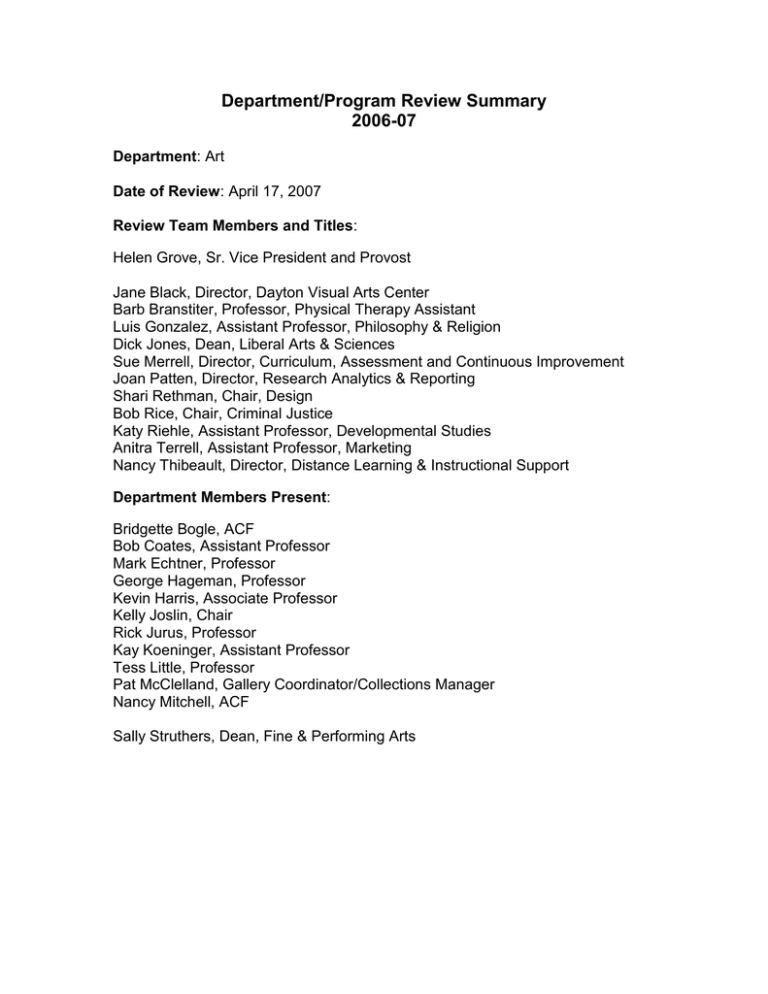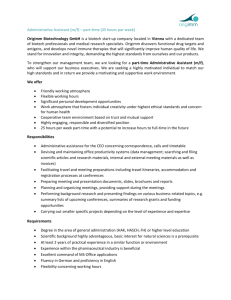Department/Program Review Summary 2006-07
advertisement

Department/Program Review Summary 2006-07 Department: Art Date of Review: April 17, 2007 Review Team Members and Titles: Helen Grove, Sr. Vice President and Provost Jane Black, Director, Dayton Visual Arts Center Barb Branstiter, Professor, Physical Therapy Assistant Luis Gonzalez, Assistant Professor, Philosophy & Religion Dick Jones, Dean, Liberal Arts & Sciences Sue Merrell, Director, Curriculum, Assessment and Continuous Improvement Joan Patten, Director, Research Analytics & Reporting Shari Rethman, Chair, Design Bob Rice, Chair, Criminal Justice Katy Riehle, Assistant Professor, Developmental Studies Anitra Terrell, Assistant Professor, Marketing Nancy Thibeault, Director, Distance Learning & Instructional Support Department Members Present: Bridgette Bogle, ACF Bob Coates, Assistant Professor Mark Echtner, Professor George Hageman, Professor Kevin Harris, Associate Professor Kelly Joslin, Chair Rick Jurus, Professor Kay Koeninger, Assistant Professor Tess Little, Professor Pat McClelland, Gallery Coordinator/Collections Manager Nancy Mitchell, ACF Sally Struthers, Dean, Fine & Performing Arts Commendations: The faculty in the Art Department are a collegial group who work well together in the development and delivery of the department’s courses and programs. The faculty have strong credentials in their disciplines, and the diversity and range of their creative work are impressive. The department has an effective, well-respected chair who provides sound leadership and management for the department. The department shares accreditation with the Design Department from the National Association of Schools of Art and Design, an endorsement about which the department is quite proud. Based on feedback received in professional networks, as well as the state’s Transfer Assurance Guide process, this accreditation helps Sinclair students more readily transfer their credits to baccalaureate level programs and to competitive art schools. The department’s work with assessing student learning, both in the discipline and in general education, is embedded in practices across the department. Especially noteworthy are the faculty reports of how critique, self-assessment, the portfolio course (195), the gallery exhibition course (295) and feedback from professionals are used to assess students’ mastery of program learning outcomes and promote greater student understanding of their progress. The department’s attention to general education competencies across courses is impressive, and the sophistication of assessment of these competencies is increasing. Especially noteworthy is the attention to writing and speaking skills and the value faculty place on these skills in their work with students. The Art Department prepares students well for transfer for further study, an important goal of the department. Sinclair’s art students are accepted at and recruited by a variety of institutions, and the department’s emphasis on helping students develop their own unique style is regarded as an advantage in students’ competitiveness. The department’s careful attention to supporting part-time faculty and ensuring quality across sections of classes taught by part-time faculty is noteworthy. Full-time faculty stay connected to part-time faculty through varying their own teaching schedules to include evening and weekend classes, and the lead faculty for courses regularly mentor part-time faculty. Review and critique of student work produced in sections taught by parttime faculty also serves as an indicator of the quality of teaching by parttime faculty. The department has developed high quality online courses, and student success in these courses is quite good. The Art Department is well connected to the local arts community, and the department’s exhibitions by students, faculty and visiting artists are very well received by the campus and community. Reach Across Dayton continues to make valuable contributions to the local community. Recommendations for Action: Because mathematics is a stumbling block for many art students, pursue with the Mathematics Department the possibility of teaching sections of selected courses using approaches that would appeal to visual learners. Increase completion rates in the department’s degree/certificate programs. In conjunction with RAR, conduct research on why students are not completing the programs and identify ways to help more students finish program requirements. Review the arts administration program and determine what revisions to this program, if any, are needed to update and refresh the curriculum. Explore options for additional space and/or alternative uses of existing space in order to support growth in high priority areas. Consider opportunities for offering more sections of selected classes off campus. Explore opportunities to offer continuing education for working artists, including workshops and courses that deal with business practices for working artists. Increase the visibility of the Art Department on campus, and develop creative strategies for articulating and sharing the learning that is accomplished through the arts. Promote the department’s NASAD accreditation more widely. Review the department’s curriculum, deleting courses that are not offered frequently and/or courses that attract few students. Overall Assessment of Department’s Progress and Goals: The Art Department is a strong and effective academic department at Sinclair and one that is doing an excellent job of educating students. The faculty have impressive records of accomplishment and appear highly committed to students and their development as learners, artists and professionals. The department’s outreach activities, including exhibitions and events such as Reach Across Dayton, make valuable contributions to the community. Evident in the self-study and review itself is the department’s continuing attention to growth, innovation and high quality, commendable commitments that will serve the department well in the future. Institutional or Resource Barriers to the Department’s Ability to Accomplish its Goals, if any: The Art Department reported that its students, like those of many other programs, struggle to successfully complete mathematics requirements. Alternative teaching approaches in mathematics that take into consideration the needs and interests of visual learners should be explored. Additional space and/or alternative use of existing space will be important to the department’s desire to expand and grow.



